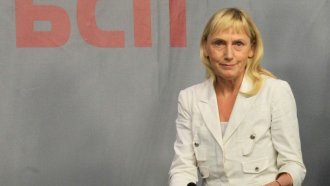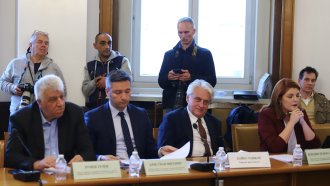Opinion:
Maya Manolova and Yordanka Fandakova announce Sofia mayoral candidacy
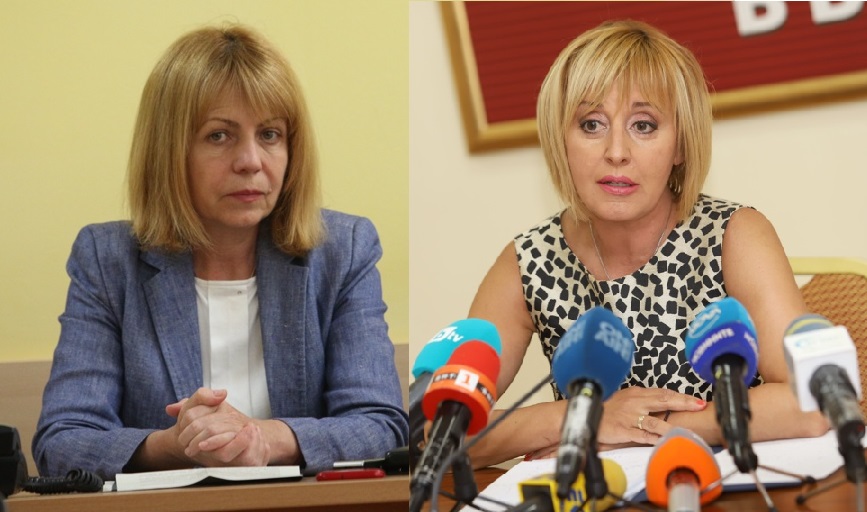
Yordanka Fandakova (left), Maya Manolova (right)
Maya Manolova announced she will be running for Sofia mayor this week, just hours after the current mayor, Yordanka Fandakova confirmed she will enter the race to seek a fourth term.
Both women were the subject of much speculation for months and debated by observers as almost certain candidates. Several weeks ago, a leading Bulgarian pollster published the results from a poll it conducted about voter support split between Manolova and Fandakova, should the two reach a second round of elections. Although the poll received criticism for its methodology, at that point it seemed widely accepted not only that both will enter the campaign for Sofia mayor, but they also would come against each other in a second round of elections.
In her three terms as mayor, Fandakova has always won in the first round. Such a scenario seems less and less likely, and explains why part of the campaign efforts on both sides are already aimed at a Manolova-Fandakova race in the second round. Not least of which is the fact that all three candidates to date (beside Fandakova), are running on a platform, which is definitely tailored against Fandakova, and Manolova has already stated publicly that she will count on voters casting their ballot against Fandakova.
Maya Manolova, who resigned as national ombudsman to enter the mayoral race, is running as an independent. The largest parliamentary opposition, the Bulgarian Socialist Party will most likely support her. She was a long-time BSP member and MP before taking the office of national ombudsman. Manolova is one of the few politicians, who although heavily associated with BSP, tend to reach supporters outside BSP’s base. This is probably due to her frequently taking an active stance in various public protests or conflicts, like the protest of parents of children with disabilities, which sought to change number of laws concerning people with disabilities. However, she has also made stands that will haunt her campaign: in 2013 during the 400+ days of protests against the government of Plamen Oresharski, she campaigned in favor of the government. Manolova also went public with the claim that the protesters were paid. The unprecedented protests began with the appointment of media mogul Delyan Peevski as head of the State Agency for National Security. This is a serious piece of Manolova’s public history, which a critical part of the electorate will not overcome, regardless of their contempt for Fandakova’s governance.
Fandakova has held the office of Sofia mayor for three terms. The last several years – especially – has been very difficult for her mayorship. Recently she and her team showed that this administration, in all its years in office, is still incapable of governing the city well and is struggling immensely especially in carrying out renovations in the city. In a questionable attempt to acknowledge the issues and escape responsibility, she said that if she runs for mayor for a fourth term, she will do it with an entirely new team.
The mounting problems with street repairs, continuing neglect of air pollution, numerous construction extensions at key points in the city have heavily compromised Fandakova’s image. This coupled with the consistent corruption in the administration practically was the reason the organization Spasi Sofiya (Save Sofia) was established, which exposed many of the current administration’s missteps; one of the co-founders of Spasi Sofia, Boris Bonev, is now also running for mayor. Democratic Bulgaria’s candidate, Borislav Ignatov, apart from being fundamentally against GERB, is also running against Fandakova in the same way as Spasi Sofiya. These two candidacies will likely split the liberal vote in Sofia at the finest of points. They will both secure the votes of the electorate, which is both against GERB and BSP, which is significant in Sofia. The two are more or less campaigning on similar platforms, at least at first glance. The differences and ultimate successes and failures will rely a lot on the actual campaign.
Manolova’s success relies much on voter who does not want to see Fandakova win a fourth term. Especially in a possible (and rather likely) second round, these votes will prove decisive: most voting will be votes against, rather than for, given they go out to vote at all. The importance of these voters for Fandakova and Manolova is already visible in the first week of the campaign: Manolova addressed the issue with the 2013 protests, calling her support for Oresharski’s government “a mistake”. Fandakova’s campaign staff in turn seems fully aware that she is in a lot of trouble with liberal voters, who would never vote for BSP (or a BSP-supported candidate) but are on the verge to do so, if it means getting rid of Fandakova. This early in the campaign, the fight for this particular chunk of the electorate (who likely will vote for neither of the two in the first round) has begun.
This week the Ministry of Foreign Affairs issued a rather unusual official position, condemning a planned exposition, organized by the Russian Embassy, celebrating “Bulgaria’s liberation” by the USSR from the Nazis. In its position, the ministry made clear that the USSR entered Bulgaria after WWII as occupiers, not as liberators. While this is an adorable position in its own, it should be noted that the ministry rarely speaks in such crisp terms about communism. PM Boyko Borissov and his governments (three to date) have always been wary of stepping anywhere near Russian interests (or nerves) in Bulgaria, although he doesn’t like to admit it, and such official condemnations are a rarity to say the least. The position will be invaluable in a second round to secure the voters, who are contemplating to vote for Manolova against Fandakova. Establishing Fandakova/GERB in firm anti-communist terms might prove essential Manolova’s ultimate loss. Such a stance – even if Manolova would hypothetically be inclined – is entirely impossible for her. In a sense the executive branch has done better in solving Fandakova’s problem with Manolova than any of their campaigns could: it drew a fundamental distinction between them, a distinction otherwise non-existent in the eyes of this particular electorate. Regardless if this was a motive for issuing the position, it will definitely make its use to that end.
At the same time it should be noted that both Fandakova and Manolova will benefit a lot if they dominate the field in a way that instills the notion that the real fight is just between them. Persuading voters that most of the electorate is either/or Fandakova/Manolova is their best chance to undermine the other two opponents, Borislav Ignatov and Boris Bonev, without attacking them in substance terms. They, however, have significant support in Sofia, as a large chunk of said electorate feels the opposition between Fandakova and Manolova is a superficial one and in fact they both represent the same establishment.
On some points everyone agrees: all four candidates say that the next city government will need to address “problems that have been mounting for decades”, and that will not be easy. The quoted phrase was uttered by current mayor and – again – seeking fourth term as such, Yordanka Fandakova, during an interview this week. Another point of certainty is that Sofia is key for GERB’s future as the principal party in the country. If GERB’s power in Sofia is broken, the national level will follow. Which in turn will open the political field for some much-needed uncertainty in the next government elections.
In other news:
Some systems in the National Revenue Agency not upgraded since 2008: Vencislav Karadzhov
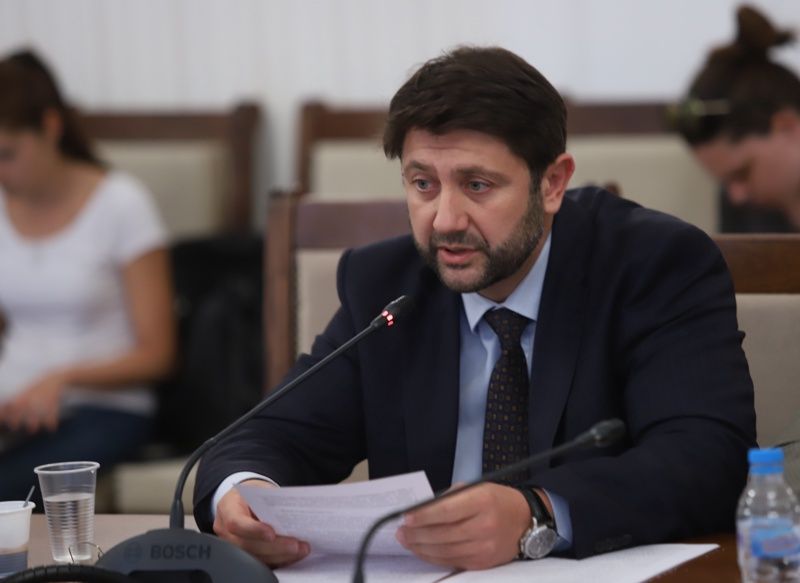
Vencislav Karadzhov
The head of the Commission for the Protection of Personal Information held a special hearing to present the results of the investigation his office conducted into the National Revenue Agency. In an unprecedented hack into the agency’s systems the personal information of almost every Bulgarian adult was stolen and eventually leaked on the internet. The commission fined the agency 5,1 million leva last week for failing to keep the data safe.
In his report, Karadzhov declared that some systems, on which the NRA relies have not been upgraded since 2008, including critical systems with storing personal data. According to Karadzhov, although the systems have had updates, their overall grade, and level of protection they provide is appropriate for 2008 machines, which is devastatingly low, given these keep all the crucial personal data of all Bulgarian citizens, as well as foreigners, who have had to submit tax returns or other financial documentation to the Bulgarian tax authority.
One of the conclusions from the investigation is that the NRA has prioritized the expansion of the electronic service to citizens to such a degree that it ultimately neglected keeping the personal information it stores safe. The NRA, according to Karadzhov, neglected cyber security for the sake of introducing the electronic service systems.
PM Boyko Borissov suddenly not keen for Bulgaria in Schengen

Alexander Dobrindt (left) Boyko Borissov (right)
After spending years talking about how important Schengen is, that his government is working tirelessly so Bulgaria becomes part of Schengen, and how this goal is almost always just around the corner, now PM Boyko Borissov feels it will not be a good idea to enter.
Borissov was on a visit to the Bundestag on Tuesday, at the invitation of the Christian Social Union Group and its leader Alexander Dobrindt.
Schengen has been a strategic goal for a very long time but Bulgaria’s failures in combatting crime and the corruption in the country, some member-states have been against Bulgaria’s entrance. As always, the EU representative, in this case – Alexander Dobrindt, with whom Borissov met in Berlin, said Bulgaria has had a significant advance in Schengen and the Eurozone, but cannot say anything definite with regards to timeframe.
Borissov said that “even if [he is] in opposition, he would not welcome Bulgaria becoming part of Schengen in land border”, and went on to suggest opening the boarder with Greece migrant lead to a migrant influx.
In both cases, Schengen and the Eurozone, Borissov likes to boast that Bulgaria has fulfilled all formal requirements and is on its way in. But in reality, what is keeping Bulgaria off these unions is nothing formal: it is the substantial fact that this government is doing little or nothing to combat corruption and to reform the justice system – something the EU has been requesting for over a decade to no avail.
Parliament overrides president veto on allowing civilian to head the military intelligence
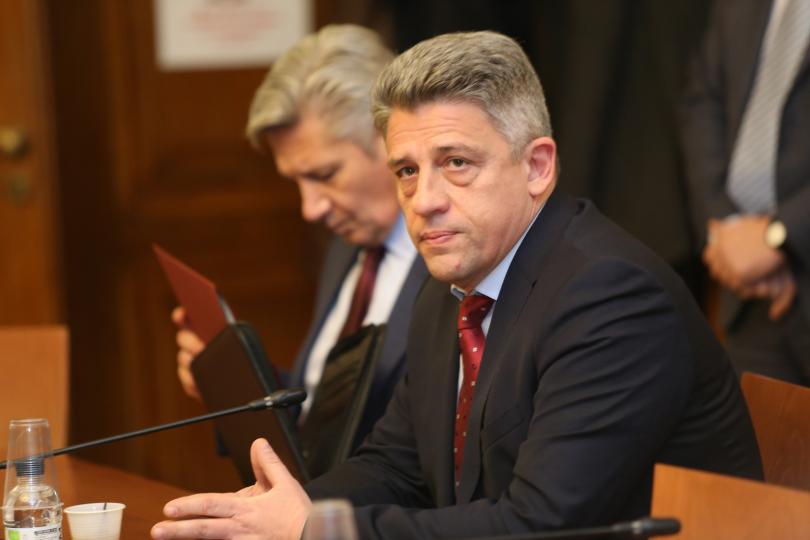
Former head of the military intelligence Plamen Angelov
The former head of the military intelligence, Plamen Angelov and his predecessor, Svetoslav Daskalov were accused two months of issuing over 500 permits for access to classified information illegally. The accusation was based on a formality but has not resulted in any compromise of classified information, which is undisputed by both sides of the argument. the reason the prosecutors have filed these charges is because the approvals were not signed by the head of the organization but instead by their deputies.
At the time, the accusation seemed to be constructed for the purpose of removing Angelov from his post. Observers and experts voiced concerns that this might be part of a larger effort to insert government-friendly figures inside the military intelligence and tap into its resources. The intelligence unit is overall thought of as one of the last such bodies, not serving a political agenda, and this – experts said – might end soon.
It also opened the door for amending the law, requiring the head of the so-called Defense Information Service to be a military officer. These were quickly tabled in Parliament and passed, but President Roumen Radev vetoed them. This week Parliament overrode the veto and made it possible for the military intelligence to have a civilian chief.
It is interesting that GERB voted for the exact opposite bill four years ago. Then, thanks to those amendments the then-head of the military intelligence, Yordan Bakalov, a civilian, was forced to leave office. By this example, it might very well be that GERB has someone particular in mind for the post and he is not from the military. The president, however, who must approve the future head of the military intelligence has made it clear that he will not sign off on anyone who is not from the military.
Electric scooters have no right to be on the road: Sofia traffic police

The head of traffic police in Sofia Lyubomir Kostadinov told the Bulgarian National Radio that electric scooters have no right to use the roads in Sofia and traffic police officers will penalize the riders accordingly. Kostadinov argued that the scooters when on the road should be treated as “unregisters motor vehicles” and will be fined as such.
One of the leading global e-scooter sharing services, Lime, just recently made their service available in Sofia. This spiked debate over their safety among other things, as there are no rules and regulations as to how they should behave as participants in the road network in the city. Mayor Yordanka Fandakova was present at the official start of the service in Sofia, which signaled officials are welcoming the scooters. But now the chief of the traffic police is claiming riding them on the roads is illegal altogether. According to some reports, other companies intend to enter the Bulgarian market as well.
Ключови думи
За честна и независима журналистика
Ще се радваме, ако ни подкрепите, за да може и занапред да разчитате на независима, професионална и честна информационно - аналитична медия.
 0 коментара
0 коментара
Екипът на Mediapool Ви уведомява, че администраторите на форума ще премахват всички мнения, съдържащи нецензурни квалификации, обиди на расова, етническа или верска основа.
Редакцията не носи отговорност за мненията, качени в Mediapool.bg от потребителите.
Коментирането под статии изисква потребителят да спазва правилата за участие във форумите на Mediapool.bg
Прочетете нашите правила за участие във форумите.
За да коментирате, трябва да влезете в профила си. Ако нямате профил, можете да се регистрирате.



